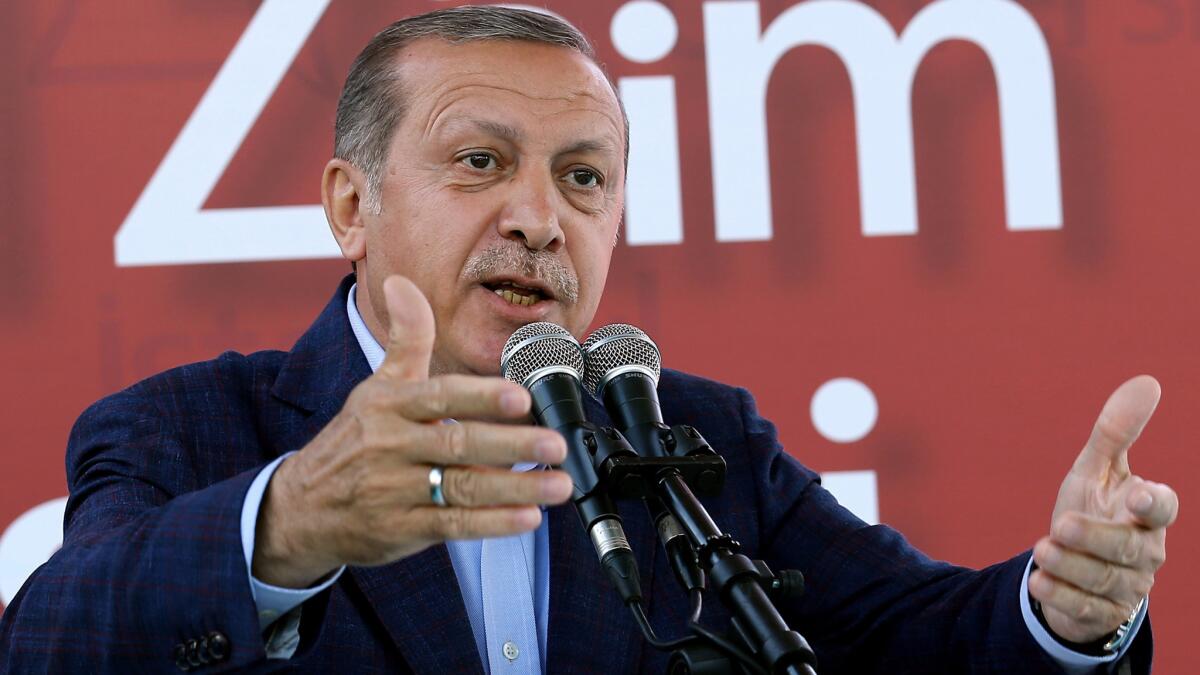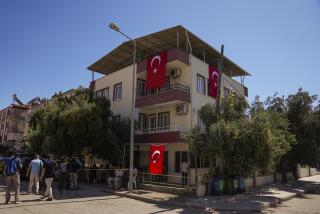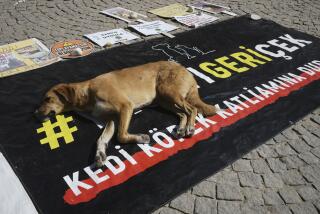Turkey’s president vows to pursue project that sparked deadly protests

Turkey’s President Recep Tayyip Erdogan addresses academicians and students at the Sabahattin Zaim University in Istanbul on June 5, 2016.
- Share via
Reporting from Antakya, Turkey — Turkish President Recep Tayyip Erdogan is vowing to pursue a divisive construction project in downtown Istanbul that sparked mass protests three years ago and claiming that part of the project would “introduce the world” to the crimes of Western powers.
The project would see the last remaining piece of green space in downtown Istanbul’s Gezi Park replaced with a replica Ottoman-era military barracks, a new “Sultans’” mosque and an opera house.
The combative president also claimed during the weekend that part of the project would highlight crimes committed by Germany, France and the United States, following a decision by the German Parliament this month to label the mass killings of Armenians during the Ottoman collapse as genocide.
“The world should know all of them,” Erdogan said in a speech in Istanbul on Saturday, “and we should all see what they have done.”
Turkey has long challenged the use of the term “genocide” to describe the massacres beginning in 1915, arguing that they cannot be separated from the historical context of global upheaval around the time of World War I.
Historians largely agree that about 1.5 million Armenians were slaughtered in a state-organized campaign of ethnic cleansing and on long death marches in what many consider the first genocide of the 20th century.
See the most-read stories in World News this hour >>
Istanbul residents opposed to the project reacted angrily to Erdogan’s plans. The protests three years ago left eight people dead and thousands injured.
“If he tries, there will be mass riots again,” said Timur Karadeniz, who participated in the protests that swept the nation in the summer of 2013. “I think he is trying to change the agenda by making provocative statements: Tourism is horrible this year and [he is embroiled in a scandal about] his fake university diploma.” Recent controversy in Turkey has centered on whether Erdogan graduated from university, a requirement for the presidency.
Many Istanbul residents lament the city’s shrinking green space and rampant construction projects that have turned the mega-city on the Bosporus Strait into a concrete sprawl. Erdogan, however, said the project was central for Turkey to “reclaim its heritage.”
“If we want to preserve our history we must rebuild this historic structure,” he said of the military barracks, according to media reports.
Turkey’s ruling Justice and Development Party, or AKP, has vowed that 2016 would be “the year of the mega-construction projects” – a reference to Erdogan’s building blitz that he believes signifies Turkey’s rise to the highest echelons of global power and exalts the virtues of his political Islamist, or neo-Ottoman, movement.
Join the conversation on Facebook >>
A new “mega-mosque” perched atop Istanbul’s highest hill – replete with the world’s tallest minarets – and modeled on Istanbul’s iconic Blue Mosque is due to open next month. A third bridge on the Bosporus named after Sultan Selim the Grim, who vastly expanded the Ottoman Empire, is expected to open in August.
“There is competition between two architectural currents: Republican and Ottoman,” said Korhan Gumus, a prominent Istanbul architect who views the construction frenzy as a broader battle for ownership of identity in Turkey. “These projects become icons and symbols of Erdogan’s [Ottoman] power. They represent Erdogan.”
Part of Erdogan’s Gezi Park vision would see the Ataturk Cultural Center on Taksim Square’s eastern fringe, a prominent example of Republican architecture, demolished and replaced with an opera house or a museum.
Erdogan said this was necessary to “show the country’s sense of art,” according to Hurriyet Daily News.
Turkey’s top administrative court blocked Erdogan’s Gezi Park redevelopment plans after 2013’s protests, but last year reversed its decision, following an appeal by the Istanbul municipality and what critics contend is Erdogan’s encroachment on the judiciary.
Since ascending to the presidency in August 2014, Erdogan has sought to entrench and expand his powers. He is presently seeking to garner enough support in parliament to take a new constitution, increasing his powers, to a public referendum.
Parliament recently passed a bill that lifted the political immunity of 138 lawmakers, mostly from a pro-Kurdish opposition party that last year dealt a stunning defeat to the AKP in national elections, temporarily scuttling Erdogan’s plans for a shift to a presidential system of rule.
Erdogan signed the bill into law June 7 – one year to the day after he lost his parliamentary majority, later reclaimed in a redo election in November – paving the way for the lawmakers’ prosecution on terrorism and other charges, and expulsion from parliament.
“There is already a leader in this country and he is engaging in politics,” Erdogan’s chief economy advisor, Yigit Bulut, said recently, according to Hurriyet Daily News. “There is no need for anyone else to engage in politics.”
Johnson is a special correspondent.
MORE NEWS FROM AROUND THE WORLD
Why the ‘Brexit’ idea is shaking up markets worldwide
Tens of thousands of Japanese protesters oppose U.S. troops in Okinawa
More to Read
Sign up for Essential California
The most important California stories and recommendations in your inbox every morning.
You may occasionally receive promotional content from the Los Angeles Times.










